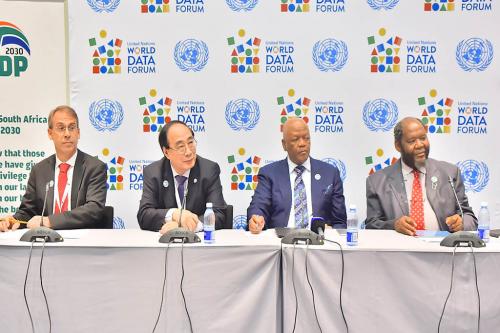UN Data Forum opens in South Africa to harness power of data for sustainable development
The inaugural United Nations World Data Forum kicked off in the South African city of Cape Town on Jan 15, bringing together more than 1,500 data experts from more than 100 countries, with the aim of building broad consensus on how to harness the power of data for sustainable development.

Wu Hongbo, United Nations Under-Secretary-General for Economic and Social Affairs, second from left, addresses members of the media at the UN World Data Forum in Cape Town, South Africa, on 15 January.
Organized by the UN in cooperation with the South African government, the four-day gathering also aims to rally support behind a new global action plan.
“The Forum comes at a crucial time for strengthening data and statistical capacity globally. Countries all around the world are mobilizing to carry out the 2030 Agenda for Sustainable Development, which they adopted at a UN summit two years ago,” Wu Hongbo, the UN Under-Secretary-General for Economic and Social Affairs, told a press conference at the opening of the Forum.
“To do so, it is essential to have accurate, reliable, timely and disaggregated data. We need to track the unprecedented range of economic, social and environmental goals that are integrated under sustainable development. This will require everyone in the statistics and data community – from governments, the private sector, the scientific and academic communities and civil society -- to find ways to work across different domains and create partnerships and synergies,” he added.
The 2030 Agenda was adopted by world leaders in September 2015 at an historic UN summit. A key component of the agenda is the 17 Sustainable Development Goals (SDGs), which came into force on 1 January 2016, and which set out new 15-year targets for global efforts to end all forms of poverty, fight inequalities and tackle climate change, while ensuring that no one is left behind.
Mr. Wu stressed that the 2030 Agenda also poses enormous challenges for the global statistical community, to modernize and improve our capacity, so that all national statistical offices become the new data hubs for data sources from across many different data systems and provide the necessary data to inform policies, and for national, regional and global monitoring.
“To make this happen, we will need governments, international organizations, businesses, academia and civil society to join forces and work together,” he said.
The Forum will preview the Global Action Plan for Sustainable Development Data, which has been prepared over the past year by a high-level group of experts responsible for statistics and data policy in their countries.
The Plan calls for a commitment by governments, policy leaders and the international community to undertake key actions under six strategic areas, including: coordination and leadership; innovation and modernization of national statistical systems; dissemination of data on sustainable development; building partnerships; and mobilizing resources. It will be formally approved by the UN Statistical Commission at its 48th session in March this year.
Jeff Radebe, the Minister in the Presidency for Planning, Monitoring and Evaluation, and Chairperson of the National Planning Commission of South Africa, said open government cannot succeed without open data that is freely accessible to all citizens, and that “numbers will form the bedrock of a better life for all.”
According to the Forum’s organizers, the event will also provide an opportunity for major producers and users of data and statistics to come together to launch new initiatives and innovative solutions that will deliver better data on health, education, income, environmental indicators and other aspects of sustainable development.
The substantive part of the Forum will start on Monday, with close to 100 sessions and parallel events scheduled through Wednesday, including data labs and interactive knowledge-sharing spaces, as well as more traditional keynote speeches and panel discussions.
Source:United Nations
- 326 reads
Human Rights
Fostering a More Humane World: The 28th Eurasian Economic Summi

Conscience, Hope, and Action: Keys to Global Peace and Sustainability

Ringing FOWPAL’s Peace Bell for the World:Nobel Peace Prize Laureates’ Visions and Actions

Protecting the World’s Cultural Diversity for a Sustainable Future

Puppet Show I International Friendship Day 2020

